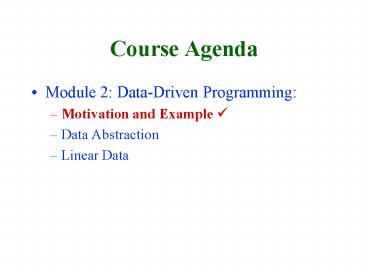Course Agenda PowerPoint PPT Presentation
1 / 15
Title: Course Agenda
1
Course Agenda
- Module 2 Data-Driven Programming
- Motivation and Example ?
- Data Abstraction
- Linear Data
2
Data Driven Programming- Example
- Recall the scenario
- Requirement
- Drama club Professor-in-charge wants an
electronic list of members. - Design Choice
- Ordered List if more searches than additions
- Unordered List if more additions than searches
- What if data is not available?
- Prepare for both eventualities
3
Data Abstraction - Principle
- Abstraction
- Provide a view (I.e abstract) by hiding details
- Data Abstraction
- Expose operations (View)
- Hide representation
4
Data Abstraction - Application
- What to show Prof-in-charge?
- List of operations
- add(Member, List, ListSize) returns ListSize
- delete(Member, List, ListSize) returns ListSize
- isMember(ID, List, ListSize) returns Boolean
- Limitation of the Interface
- ListSize needs to be passed to operations
Prof-in-charge should not be bothered by such
details ?
5
Data Abstraction Interface Declarations
/ file dramaClubOps.h /
include dramaClubList.h
/ Pre-condition - Size of ms is n. - ms is a
list of Member elements. Post-condition - m
added to ms if not present and overwritten if
present. - return the size of the (possibly)
updated list /
extern ListSize add(Member m, List ms, ListSize
n)
6
Data Abstraction Interface Declarations
/ file dramaClubOps.h /
/ Pre-condition - Size of ms is n. - ms is a
list of Member elements. Post-condition - m
deleted from ms if present ms unchanged
if not present. - return the size of the
possibly updated list /
extern ListSize delete(Member m, List ms,
ListSize n)
7
Data Abstraction Interface Declarations
/ file dramaClubOps.h /
include boolean.h
/ Pre-condition - Size of ms is n. - Each
element of ms can be matched against an ID
Post-condition -return TRUE if ID matches
against an element in ms FALSE
otherwise /
extern Boolean isMember(ID i, List ms, ListSize
n)
8
Data Abstraction Types
/ file dramaClubList.h /
typedef unsigned int ID typedef unsinged int
ListSize
define MAX 1000
typedef unsigned int Member // List is an array
of at most MAX elements of type Member typedef
Member ListMAX
9
Data Abstraction Types
- Enumerated Type
- Recall that a type is a set of values
- E.g. Boolean TRUE, FALSE
- E.g. DaysOfWeek Su, Mo, Tu, We, Th, Fr, Sa
- C Syntax
- typedef enum TRUE 1, FALSE0 Boolean
- typedef enum Su 1, Mo, Tu, We, Th, Fr, Sa
DaysOfWeek
10
Data Abstraction Types
/ file boolean.h /
typedef enum TRUE 1, FALSE0 Boolean
11
Data Abstraction - Implementation
/ file dramaClubOps.c / include
dramaClubOps.h
ListSize add(Member m, List ms, ListSize
n)
int pos, newsize n if (n1 gt MAX) return 0
// This should lead to a test case.
for (pos0 pos lt n pos) // pos iterations
if (mspos gt m) break if (mspos m)
return newsize // m already present
for ( n gt pos n--) msn msn-1 // n
pos 1 iterations
msn m return newsize
12
Data Abstraction - Implementation
/ file dramaClubOps.c /
Boolean isMember(Member m, List ms, ListSize
n) if (search(m, ms, n) gt 0) return
TRUE else return FALSE
// Exercise Implement delete
13
Data Abstraction - Summary
- Expose Data Types and Operations (through
Interfaces) - E.g Member and List data types
- E.g add, delete, and isMember interfaces
- Hide Representation and Implementation
- E.g. List is an array of up to MAX elements
- E.g. isMember is implemented through search.
14
Data Driven Programming - Observations
- Kinds of Data (used so far)
- Simple data elements (int, Boolean etc.)
- Data Collections Linear collections or Lists
- Often represented as Arrays
- Often referred to as Random Access Lists.
- For any i in the range (0 to size 1) Ai can
be accessed.
15
Lists as Arrays - Observations
- Operations
- Access Random element Ai
- Access each element Idiom
- for ( i0 iltN i) Ai
- Cost of (each) Access O(1)
- Independent of i
- Insertion / Deletion Random position i
- Movement of adjacent elements
- Cost O(N)
- Limitation Max size is a hard bound.

